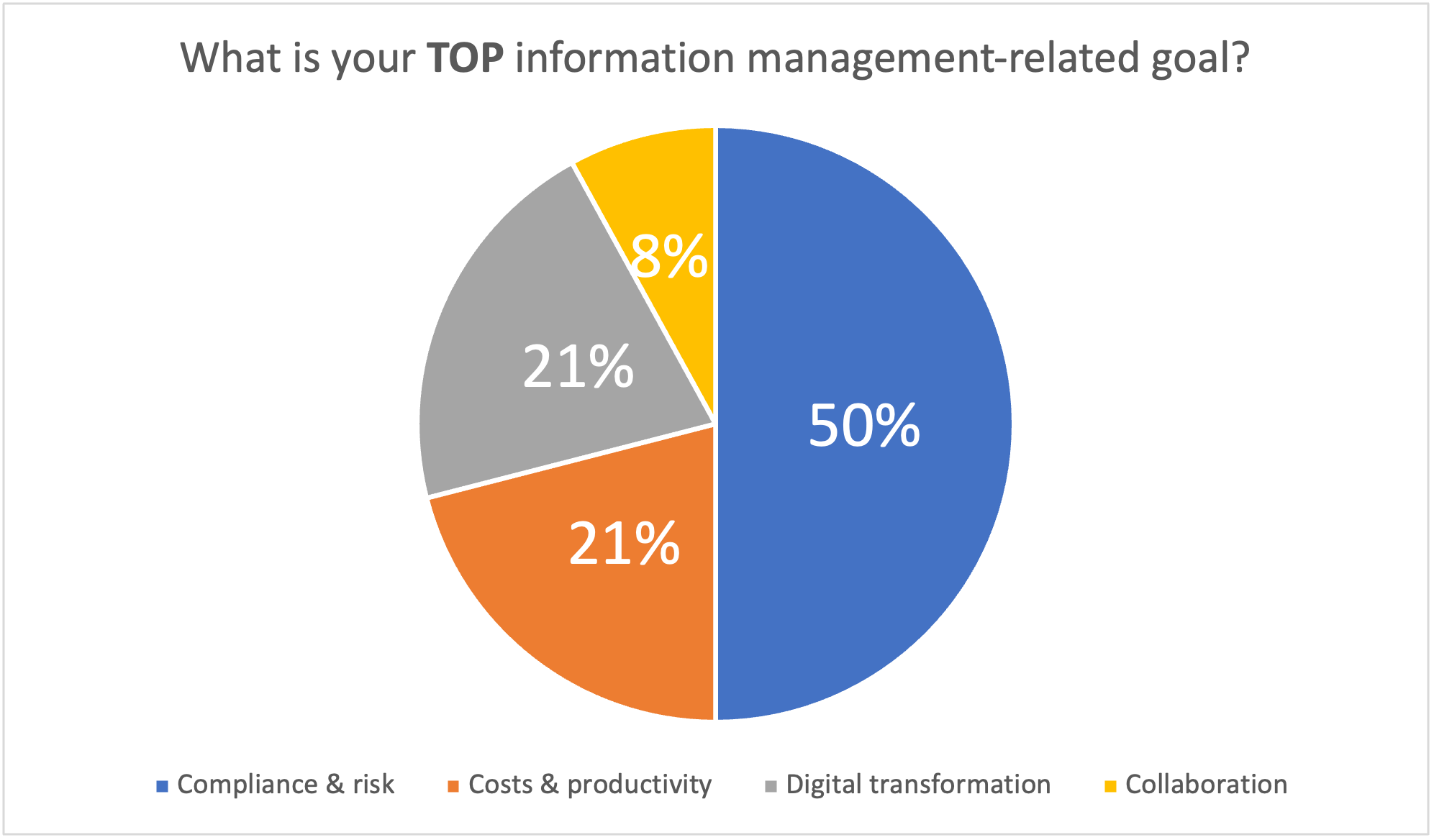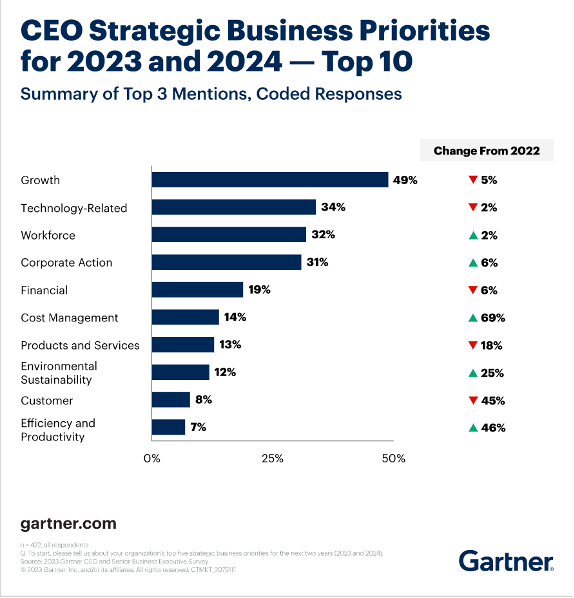Last Updated on May 18, 2023 Sarah Gayda
The time to get executive buy-in for data compliance is now, as information management priorities dovetail with senior executives’ current cost-reduction targets
In today’s digital world, information management professionals are tasked with overseeing an enormous amount of data. One of their top goals, according to the recent 2023 State of the Intelligent Information Management Industry, is compliance and risk.
This finding was supported by a recent Colligo poll. During our Optimize Microsoft 365 & Do More with Less webinar, respondents indicated that compliance and risk was their top information management-related goal.

However, senior executives and IT leaders have different priorities. They prioritize growth, cost management and productivity over compliance initiatives. Cost management was the fastest growing strategic business priority for CEOs in 2023, according to Gartner. Compared with 2022, the cost management priority grew 69%.

This discrepancy in priorities can create challenges in getting buy-in and support for compliance efforts.
In this blog post, we’ll explore why these two groups have differing priorities, and how information management professionals can use this knowledge to gain buy-in and support from senior leaders.
Understanding differing priorities in different parts of the organization
Why do information management professionals prioritize compliance with regulations, while senior executives prioritize costs and productivity? One possible explanation is that these two groups have different perspectives on risk.
For information management professionals, the risks associated with non-compliance (e.g., data breaches, government fines) are paramount. It’s no surprise that in many organizations, records management and information management works hand in hand with corporate legal!
On the other hand, senior leaders may view compliance as a necessary expense rather than a top priority. They may believe that prioritizing compliance above costs and productivity could negatively impact the company’s bottom line. In today’s climate, financial priorities could take precedent in management’s view.
Another explanation for the discrepancy in priorities could be that different groups within the company have different interests and incentives. For example, information management professionals may be driven by the need to reduce risk and ensure compliance standards, while senior leaders may prioritize maximizing revenue and profitability.
Understanding these differences in goals and incentives can help information management professionals tailor their messaging to gain support for compliance initiatives.
4 ways to build the business case & garner support for your IM initiatives
So, how can information management professionals gain buy-in and support for their compliance initiatives from senior leaders? Let’s look at some effective approaches.
1. Frame compliance as an opportunity rather than a cost
By emphasizing the potential benefits of compliance (e.g., improved customer trust, reduced risk of data breaches), information management professionals can make a compelling case for investing in compliance initiatives.
2. Communicate the ROI of information governance and compliance efforts
By demonstrating the financial benefits of compliance (e.g., reduced costs associated with data breaches, less time spent on administrative tasks), information management professionals can make it clear that compliance is not just a necessary expense, but a valuable investment.
3. Optimize your existing software for both compliance and cost savings
In an uncertain economic operating environment, optimizing existing software is a great way to reduce costs and maximize existing resources. ‘Doing more with less’ ensures you to get more value out of the software you already own.
For most organizations, this is Microsoft 365 (including Outlook, SharePoint, Teams, and the Office applications). So how do you get more out of Microsoft 365?
Layer on a solution that enforces compliant data and makes Microsoft 365 easier to use. Utilizing data compliance software or an add-in like Colligo for connecting Outlook and SharePoint for saving, tagging, and accessing emails and documents is a great choice.
We also recommend you tailor your existing storage or repository to your businesses use cases. Colligo, working with SharePoint, can provide what feels like a custom legal, financial, engineering, or case management system, all while keeping your data in SharePoint and leveraging Microsoft 365 under the hood.
This helps significantly with change management (through providing the familiarity of legacy systems). In addition, user adoption improves by offering user-friendly tools that knowledge workers actually want to use.
For IT leaders and executives looking for ways to reduce costs during uncertain economic times, software optimization should be at the top of the list. Not only does it help reduce expenses associated with licensing and maintenance fees, but it also improves performance and increases efficiency while helping ensure compliance with industry regulations.
4. Provide strategic insights to senior leaders
Finally, information management professionals can leverage their expertise and knowledge to provide strategic insights to senior leaders. By providing valuable insights into compliance risks and ways to mitigate them, information management professionals can become trusted advisors to senior leaders, gaining their support for compliance initiatives.
Long-term business success comes from prioritizing compliance
In conclusion, compliance and risk is a top priority for information management professionals, while senior leaders prioritize costs and productivity.
To gain buy-in and support for compliance initiatives from senior leaders, information management professionals must understand these differences in priorities and tailor their messaging accordingly.
By framing compliance as an opportunity, demonstrating the ROI of compliance efforts, and leveraging their expertise to provide strategic insights, information management professionals can make a compelling case for investing in compliance initiatives. Further, optimizing existing software and implementing data compliance solutions like Colligo enable your business to do more with less.
Ultimately, by prioritizing compliance, companies can reduce risk and improve customer trust, leading to long-term success.
Get in touch for more information or start a free trial of Colligo now.


